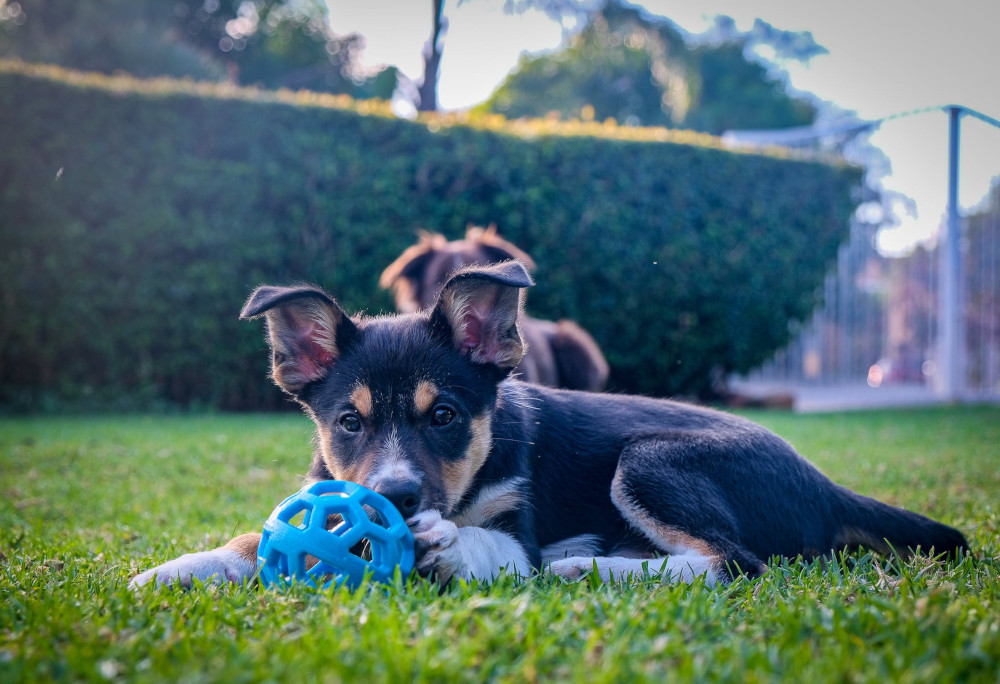What should I do when I bring home a new puppy?

Before bringing home a new puppy, make sure that you can fully commit to the lifelong responsibilities of caring for a dog. Welcoming an animal into your household is an important decision. RSPCA care centres receive thousands of unwanted and abandoned animals each year, sometimes the result of ill-considered or impulsive decisions, and it is in everyone’s best interests for you to be fully prepared to give your dog the best life possible.
First, thoroughly research the basics of puppy and dog care:
- Read up-to-date books and online resources from reliable sources.
- See the RSPCA resources below.
- Seek advice from people with experience and expertise in animal health and welfare (e.g., a veterinarian) to understand what animal is best for you, their long-term needs, and potential health issues (e.g., specific breed-related health problems).
Once you have done your research, you need to prepare. Make sure you provide for all your new puppy’s needs: a safe living space, a comfortable sleeping area, balanced nutrition, clean fresh water, socialisation, training, play, exercise, identification, desexing, and preventative health care.
A safe living space
Set up a living space where your puppy can safely stay while they get used to their new environment. Check the area to make sure there isn’t anything dangerous that they might access by accident. Give them toys, and opportunities to express natural behaviours and engage in different physically and mentally stimulating activities (enrichment).
A comfortable sleeping area
Create a comfortable and easily accessible sleeping area where your puppy can sleep and rest. Give them soft bedding, and make sure they will be cosy and dry, and not too hot or cold.
Balanced nutrition
It is essential to provide balanced nutrition that is appropriate for your puppy’s life stage.
Your veterinarian can advise you in detail.
Clean fresh water
Give your puppy constant access to clean fresh water in a bowl made of non-toxic material that they cannot chew or knock over.
Socialisation
Socialisation involves exposing an animal to a range of experiences to help them prepare for and cope with different situations, interactions, and environments.
Between 3 and 14 weeks of age (the critical socialisation period), a puppy’s experiences will shape their mental health, and how they behave into adulthood. It is essential for their development that you give them a wide range of positive experiences, particularly during this time. Expose them to different sights, sounds, smells, people and other animals, to ensure your puppy grows into a well-adjusted adult who relates well to others and the world around them.
The best way to begin socialising your puppy is to enrol them in reward-based puppy school classes or ‘puppy kindy’, usually offered through veterinary clinics and some RSPCA care centres.
Training
The RSPCA supports reward-based training methods involving positive reinforcement (desired behaviours are rewarded and unwanted behaviours are ignored not punished). Reward-based training is effective and the most humane form of training. It is enjoyable and sets your dog up to succeed. Training programs based on aversive (painful or unpleasant) methods, dominance, force or punishment must not be used as they are inhumane and can cause long-term behavioural problems.
Play
Play is not just for fun. Providing your puppy with opportunities to engage in different types of play, individually, with other animals, and with people, will help develop motor, social and problem-solving skills, and strengthen bonds.
Exercise
Fit your dog’s exercise into your daily routine. Walks are often a dog’s favourite part of the day – they are able to explore, enjoy different experiences including smells, socialise, and spend time with you. Exercise also provides various physical health benefits.
It is essential to ensure that your puppy is microchipped, wears a collar with a tag, and is registered with your local council. Talk to your vet to organise desexing and preventative health care (e.g. vaccination, worming, external parasite control).
Was this article helpful?
This work is licensed under a Creative Commons Attribution-NonCommercial-NoDerivatives 4.0 International License.


